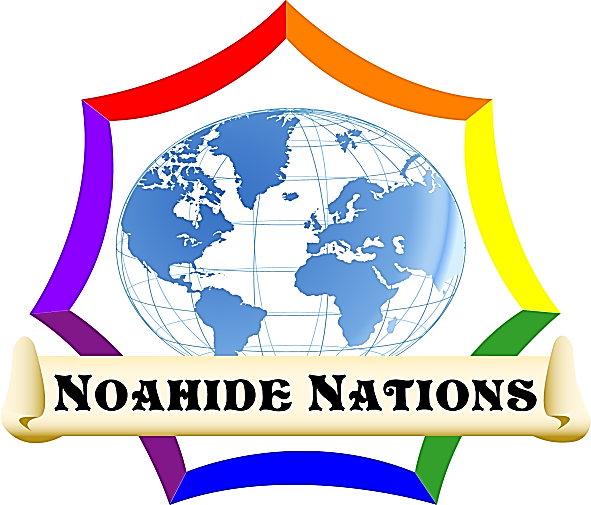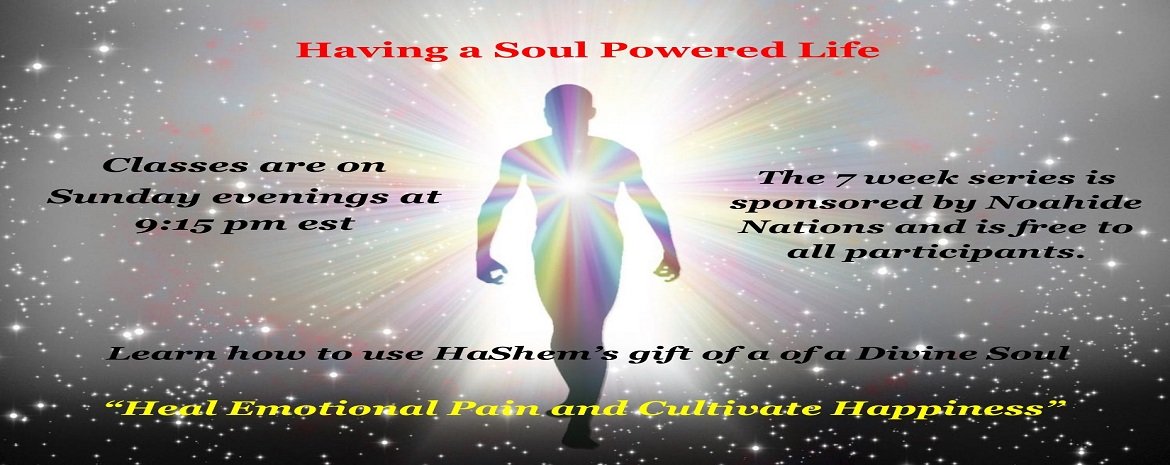
Noahide Torah Courses
Noahide Nations has conducted nearly 3000 live online Torah classes over the past 15 years. Many of these classes are available in audio recordings. Here are just some of these courses.
God's Instructions
When God created man on the 6th day He wanted mankind to live in peace and harmony, through His Mercy. He gave Adam 6 instructions in order to live this way. After the flood He gave Noah a 7th. These are the Noahide Commandments.

Read More +
Noahide Prayer
For Noahides, prayer is considered a mitzvah when performed in response to personal needs or circumstances.

Read More +
Develop a Torah Personality
Help for perfecting your relationship with HaShem and yourself.

Read More +
Listen To Noahide Laws & Life Cycle Class
Listen to the overview from a previous class from the Noahide Torah Study Yeshiva Course.

Read More +
Seek Torah Wisdom
Torah wisdom should always flow through you. Learn about Hashem and you will learn about yourself!

Read More +
After The Flood
Ever wonder what happened when Noah and his family exited the Ark after the Flood?
Wisdom From Pirke Avot
Simon the Just…used to say,
“Upon three things the world stands:
On Torah, on (Divine) Service, and on Deeds of Lovingkindness.”
Pirke Avot 1:2
Ben Zoma said,
“Who is wise? The one who learns from all people…
“Who is mighty? The one who subdues the evil inclination…
“Who is rich? The one who rejoices in his portion….
“Who is honored? The one who honors other human beings….”
Pirke Avot 4:1
The Most Important Part of Studying Torah
The most important element in validating interpretations of the written and oral Torah is the concept of Mesorah. Mesorah is the greatest proof to the authenticity of any concept, practice, or interpretation.
Although the seven Noahide laws have their origins in Adam and Noah, God chose to transmit and preserve them via Moses and the giving of the Torah at Sinai. This placed the Seven Mitzvos within the structure and system of Torah study and learning. Therefore, the seven Noahide laws must be interpreted and understood within the context of the Torah.
This point cannot be stressed enough: Jewish, and therefore Noahide, study and interpretation of the Torah is unique and unlike the study of any other religious texts.
The Truth About the Ger
Don't ever be afraid of seeking truth or speaking the truth, as it says in
Proverbs 12:19...
Truthful lips will be established forever, But a lying tongue is only for a moment
Are Noahides Allowed to Pray?
For Noahides, prayer is considered a mitzvah when performed in response to personal needs or circumstances. If one experiences challenges for which he does not pray, his lack of response is tantamount to a denial of God as the sovereign ruler of all things and all events. When one does pray in such circumstances, it demonstrates reliance and belief in the Creator.
When a Noahide prays to give thanks or praise absent a personal need, he still receives reward for such prayer even though it is not of the same nature as prayer prompted by personal needs.
As with all personal prayers, there are no fixed texts for Noahide prayer. Since all Noahide prayer is essentially personal prayer, it is ideally expressed using sincere words from the heart.
Tools For Noahide Torah Study
The journey of Noahide Torah study is endless in depth and has no destination. You will realize this when your very essence proclaims, "the more I learn, the less I know"! Before you make this proclamation remember that it is a mitzvot for a Noahide to study the Noahide Laws and apply them in every aspect of their life. After you make that proclamation you will realize and appreciate why it is a mitzvot for a Noahide to study the Noahide Laws and apply them. The study of Torah is what gives us our awe of the Creator. The more we study the more awe we gain.
An Important Voice in the Science and Torah Debate
- Category: General
- Hits: 17035

Rabbi Yoram Bogacz is an important voice in the debate on the intersection of Torah and science. I know personally how important the debate between Torah and Science is. In college I was challenged by questions of how the Torah can be true if science had proven that certain claims in the Torah were false. Could I believe in God on rational grounds in the face of overwhelming evidence that contradicts the Torah? On-the-other-hand, could I really trust scientists, weren't they human beings too, and isn't science a human endeavor?
I had a few counter arguments for dating the earth and the universe, admittedly my arguments often felt a little weak. Being honest with myself I realized that so long as I refused to confront my fears I would always be plagued by them. Additionally, my private motto has always been that it doesn't matter why you began to believe something, the question is why do you continue to believe it?
I decided to learn about what science actually says about certain things by taking classes from scientists and philsophers of science.Taking classes in archaeology, evolutinary anthropology and philosophy of science I began to take some comfort in that things were not as bad as they seemed. That was largely thanks to the honesty and no spin approach to teaching that my professors had.
I also came across the writings of Gerald Schroeder not long after, and for me those were a huge help in making me feel like atheism wasn't one step away. However, there were things that bothered me by Dr. Schroeder's approach. In some ways it seemed like Dr. Schroeder was conceding too much ground to problematic scientifc theories. In essence he was saying "these theories are true, but here's why we can still believe in Torah." It also seemed problematic that Dr Schroeder's major work, Genesis and the Big Bang, made the argument that we can take current scientific thinking and demonstrate how there is complete agreement between Torah and science. That is science as it is when Schroeder wrote his book. This approach did not seem to account for the fact that scientific theories change and are modified while his approached seemed to lock Torah believers into one point in the scientific continuum.
Science is in a constant state of flux; what is factual knowledge today may turn out to be an embarrasing belief tomorrow. I also came to understand through both my archaeology and evolutionary anthropology courses that scientists were just as given to human foibles as anyone else. Even worse there were known problems in both fields where scientists on dig sites would find conflicting information to their theory (or a theory they were personally committed to) and would "lose" it (it being the problematic piece of evidence). Sometimes just tossing the find aside. These stories were told to my classes and I think many of us listened in a state of shock.
Don't get me wrong, I'm not accusing every scientist or even the majority of scientists of fraud. I'm just trying to point out that fraud is part of science like it is part of any other human endeavor. Also we should keep in mind that even legitimate research can experience the decline effect, something that even careful and rigorous experimentation cannot account for. What I am saying is that scientists, skeptics, and atheists (often one in the same) aren't the only ones with reasons to be skeptical of truth claims. We too have reasons to be skeptical of scientific claims when they conflict with the Torah tradition. Human beings are human beings and when we have a vested interest in something it's good to be careful in how much authority we give any one person or group of people.
My point is that there is no need to cower in the corner because of what science or scientists say.First we should recognize that scientists are human beings and that more than a quest for truth may be motivating them. We should be just as skeptical of what they have to say as we are skeptical about many other claims we hear in life whether religious, business, what have you. Being a serious adherrant to the Torah is reasonable and praisworthy.While being skeptical of conflicting scientific beliefs is also reasonable and praisworthy. The reason we can be skeptical is because the Torah tradition is so strong! The tradition gives us the strength to be skeptical, but we have to understand the tradtion first.
 Rabbi Bogacz has recently published a book through Feldheim called Genesis and Genes and this book should be at the top of anyone's reading list who is interested in the question of agreement between science and Torah. To help encourage you further please read reviews of the book by David Sacks in Jewish Affairs on page 41in the Hannukah edition of their magazine, and the review by Rabbi Moshe Averick in Algemeiner.
Rabbi Bogacz has recently published a book through Feldheim called Genesis and Genes and this book should be at the top of anyone's reading list who is interested in the question of agreement between science and Torah. To help encourage you further please read reviews of the book by David Sacks in Jewish Affairs on page 41in the Hannukah edition of their magazine, and the review by Rabbi Moshe Averick in Algemeiner.
It is such a pleasure for me to discover such an important thinker and writer. The Talmud tells us: "In the future, God will bring the Evil Inclination and slaughter him in the presence of the righteous and the wicked. To the righteous, he will appear as a tall mountain and to the wicked he will appear as a strand of hair. Both the righteous and the wicked will weep. The righteous will cry, saying: How were we able to overcome a mountain as high as this? The wicked will cry, saying: How were we not able to overcome this strand of hair? (Succah 52a)"
This story represents how I feel about the debate between science and Torah. For all of us who want to live our lives in accordance with truth, science (and other competing claims of truth) represent a mountain that we are constantly struggling to over come. But if we put forth the effort we will come to find that the Torah and the Torah tradition will prove itself over and over again. We can overcome that mountain and the work of people like Rabbi Bogacz, Rabbi Gottlieb, and many others are crucial aids in our struggles.
But for those who give into the fear and are overwhelmed by the "authority" of science and find themselves moving further and further away from God until they finally become atheists; may look back one day and realize it was a single hair that kept them from drawing close to God. Don't make that mistake!


 French (FR)
French (FR)  English (UK)
English (UK) 

























 Choosing a Rabbi
Choosing a Rabbi What Is Tzedakah?
What Is Tzedakah? The Science in Torah
The Science in Torah Why Study Torah?
Why Study Torah? Afterlife, Moshiach & Redemption
Afterlife, Moshiach & Redemption Your Soul
Your Soul